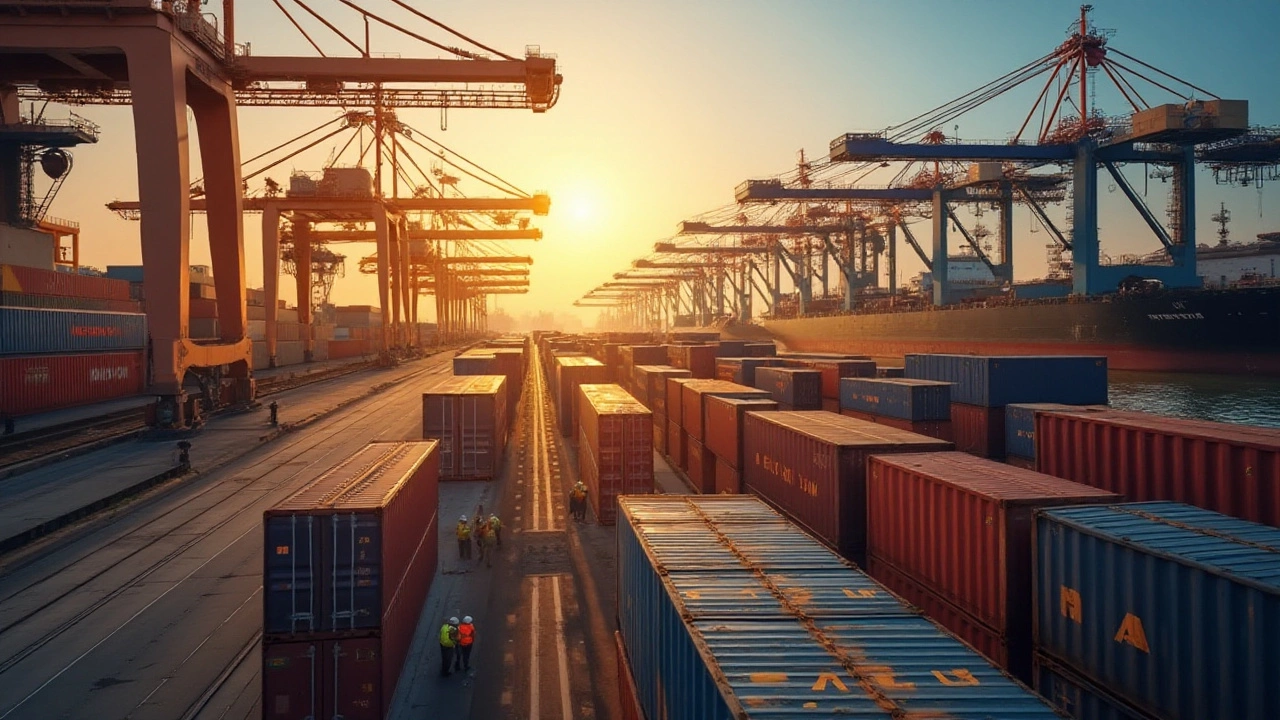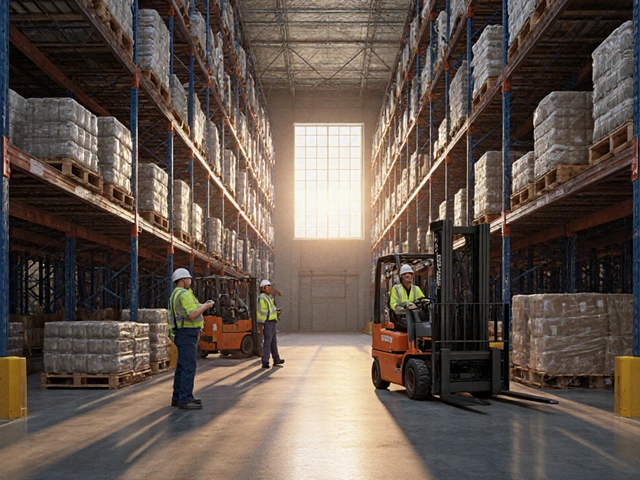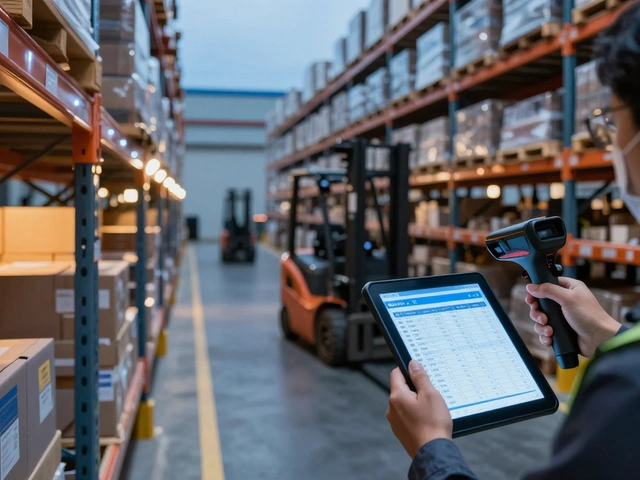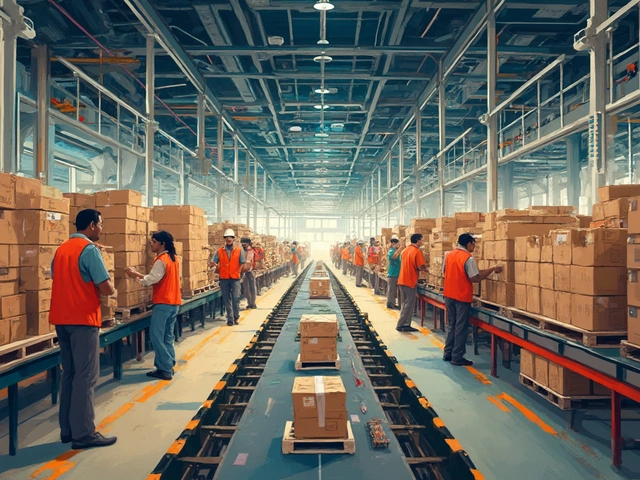In our interconnected world, logistics companies play a crucial role in the seamless transport of goods. These enterprises, which range from colossal multinational corporations to nimble start-ups, are constantly evolving to meet the demands of a dynamic global market.
Many of the companies leading the pack are recognized not just for their expansive networks, but for their innovative approaches to tackling modern challenges. These often include leveraging advanced technology to optimize efficiency and implementing sustainable practices to reduce environmental impact.
Throughout this article, we'll explore ten of the most influential logistics companies that are steering the industry into the future. You'll gain a better understanding of their operations, how they're incorporating cutting-edge technology, and their strategies for sustainability.
- The Giants of Global Shipping
- Technological Innovations in Logistics
- Sustainability Efforts in Transportation
- Emerging Leaders in the Industry
- Future Trends in Global Logistics
The Giants of Global Shipping
When we delve into the world of logistics, the name Maersk resonates with seasoned professionals and industry newcomers alike. Based in Denmark, Maersk is often hailed as the titan of the shipping world, operating over 700 vessels that move goods across the globe. This fleet represents a beacon of economic connectivity, facilitating international trade by navigating established sea routes and embracing innovative routes to tackle geographic challenges. Maersk, continuously at the forefront of technological advancements, doesn't just rest on its laurels. Instead, they are pioneering the application of blockchain technology for transparent, efficient shipping. This enables better tracking of cargo and minimizes delays at customs, a giant leap for trade facilitation.
The shipping landscape is incomplete without the mention of Mediterranean Shipping Company (MSC). Headquartered in Geneva, MSC is the holder of the second position, close on Maersk's heels. MSC illustrates a perfect blend of family business values with the injection of global expertise. Like Maersk, MSC emphasizes a proactive approach towards sustainability. In recent years, it has committed to achieving net-zero carbon emissions by 2050. Their vessel, MSC World Europa, is a testament to this pledging, as it utilizes liquefied natural gas—a more environmentally friendly fuel—compared to standard oils used by traditional carriers. These initiatives highlight how giants in the industry are setting the course toward a more sustainable and greener logistics environment.
The Japanese conglomerate Nippon Yusen Kabushiki Kaisha, better known as NYK, also deserves its place among these titans. NYK, with its rich history dating back to the late 19th century, reflects how adaptability can sustain a company for over a century. Shipping is their cornerstone, yet NYK expands its prowess into logistics and real estate, diverging from a purely shipping-based identity. Their recent investment in autonomous vessel technology promises to redefine how goods move across oceans, proposing an exciting future where fleet safety and efficiency see unparalleled enhancements.
Within the shipping behemoths, Shanghai-headquartered COSCO stands as a symbol of China's burgeoning influence in international trade. COSCO isn't just about mass; it emphasizes efficiency and connectivity through intricate networks that bridge the East to the West. In 2021, COSCO's vessel, the Xinzhangzhou, made headlines by completing a voyage through the Arctic's Northern Sea Route. This marked a significant stride toward shorter delivery times from Asia to Europe, showing COSCO's keen ability to adapt and innovate routes that address the climatic changes affecting global shipping lanes.
"Efficiency and scale are no longer the only hallmarks of logistic supremacy. The giants of today's shipping industry are also leaders in innovation, sustainability, and resilience." — Maritime Journal, 2023.These global transport giants have not only dominated the seas but have ushered in an era of digital transformation and sustainability. Through continuous innovation, they hold power to shape the logistics landscape, championing a future where efficiency meets environmental stewardship. They serve as benchmarks of excellence, steering industries beyond traditional confines into an era where logistics services are both advanced and accessible. As they navigate through the turbulent waters of global trade dynamics, these giants remain steadfast in their commitment to reshaping the world's supply chains.
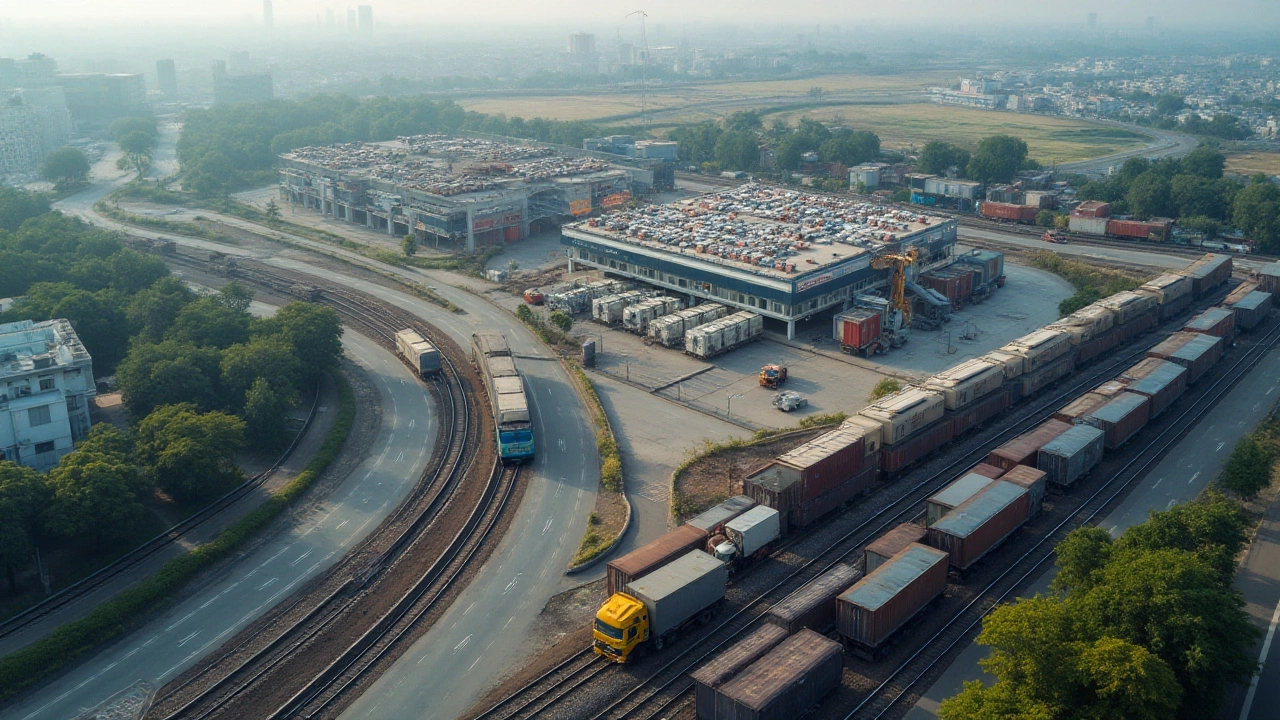
Technological Innovations in Logistics
The logistics industry, often seen as the backbone of global trade, has been dramatically transformed by an array of technological innovations. Dubbed the silent revolution, this wave of progress reshapes how goods traverse the globe from manufacturers to consumers. One essential change is the integration of data analytics and the Internet of Things (IoT). By utilizing these tools, logistics companies gain real-time insights into their supply chains, allowing them to predict demand and streamline operations.
With IoT devices embedded in shipping containers and vehicles, companies can monitor location, temperature, and even the humidity of goods during transit. This not only ensures quality but also enhances efficiency by reducing the chances of delays. A fascinating development within this space is the use of drones for last-mile delivery. Although still in its infancy, drone delivery holds the potential to revolutionize logistics by reaching remote areas faster and more efficiently.
Another standout advancement is the application of blockchain technology. By offering transparency and security, blockchain ensures the authenticity of shipments and mitigates the risks associated with fraud. This technology creates a tamper-proof ledger of transactions, simplifying complex logistics processes like customs clearance. Additionally, artificial intelligence (AI) and machine learning are becoming mainstream tools in logistics planning. These advancements optimize routes, manage warehouse inventory, and even predict maintenance needs for transport vehicles, further reducing downtime.
"AI and machine learning are the future of logistics, enabling unprecedented accuracy in demand forecasting and supply chain optimization," declares Eric Johnson, a senior analyst at a leading supply chain firm.
The advent of autonomous vehicles and robots is another significant leap forward. Companies are trialing self-driving trucks to transport goods with minimal human intervention, promising safer roads and lower costs. In warehouses, robots are assisting with sorting and packing, boosting productivity significantly. According to a 2023 industry report, automation has improved warehouse efficiency by 20% over the past five years.
These technologies are not just increasing the speed of global transport, but are also paving the way for sustainable solutions. Many logistics firms are investing in electric and hybrid vehicles, significantly reducing their carbon footprint. Simultaneously, the use of smart sensors optimizes energy consumption in distribution centers. These progressive strategies offer a clean, efficient, and robust logistics ecosystem, preparing the industry for the demands of a rapidly changing world.

Sustainability Efforts in Transportation
Sustainability has become a pivotal concern in the logistics sector, as the industry reckons with the environmental impact of global transport operations. Acknowledging its role in carbon emissions and pollution, many logistics companies have embarked on a journey to implement sustainable practices. This involves adopting new technologies and rethinking operations to reduce their carbon footprint. Leading names in the sector are setting benchmarks through innovative strategies aimed at minimizing their ecological impact and fostering a healthier planet.
One of the focal points of this green transformation in logistics is the adoption of alternative fuels. Several industry giants, such as Maersk and DHL, are investing heavily in the research and development of low-emission fuels for their fleets. For instance, Maersk has been pioneering the use of biofuels derived from waste materials, which significantly cuts down on CO2 emissions compared to traditional fossil fuels. Similarly, DHL has committed to using sustainable aviation fuels (SAF) for its air freight services. These initiatives not only demonstrate leadership but also push the boundaries of what's possible in reducing emissions throughout the supply chain.
Logistics companies are also resorting to innovative technologies to enhance sustainability. Incorporating electric vehicles (EVs) into their operations is becoming a popular choice. According to a 2023 report by McKinsey, the number of electric delivery trucks in Europe increased by 70% in just two years. UPS, another logistics heavyweight, aims to have over a third of its ground delivery fleet electric by 2035. The transition to EVs offers the added advantage of reducing noise pollution, which has long been a complaint in urban areas. By embracing quieter, cleaner vehicles, companies are making tangible contributions to improving air quality in cities worldwide.
Improving the efficiency of logistical operations further boosts sustainability efforts. The introduction of AI-powered route optimization tools helps in maintaining fuel efficiency and minimizing empty miles. By strategically planning routes, logistics companies can cut fuel consumption and emission rates significantly. For example, FedEx's proprietary systems analyze vast amounts of data to ensure goods are delivered in the most efficient manner. The saving in time and resources not only promises a cost advantage but also underscores the commitment to reducing the industry's ecological footprint.
"The transition to greener logistics isn't just a buzzword; it's a necessity for our planet's future," remarked an industry expert during a recent conference on sustainable transport.
As the industry progresses, collaboration has become a key strategy in scaling sustainable practices. Strategic alliances between logistics companies, technology firms, and environmental organizations are driving change at an unprecedented pace. Collaborations enable sharing of resources, insights, and infrastructure, amplifying the impact of sustainability initiatives. These partnerships are crucial in tackling shared challenges like emissions, fuel alternatives, and greener supply chains. The logistics sector continues to model proactive behavior; however, the journey toward a sustainable future requires both bold steps and incremental progress.
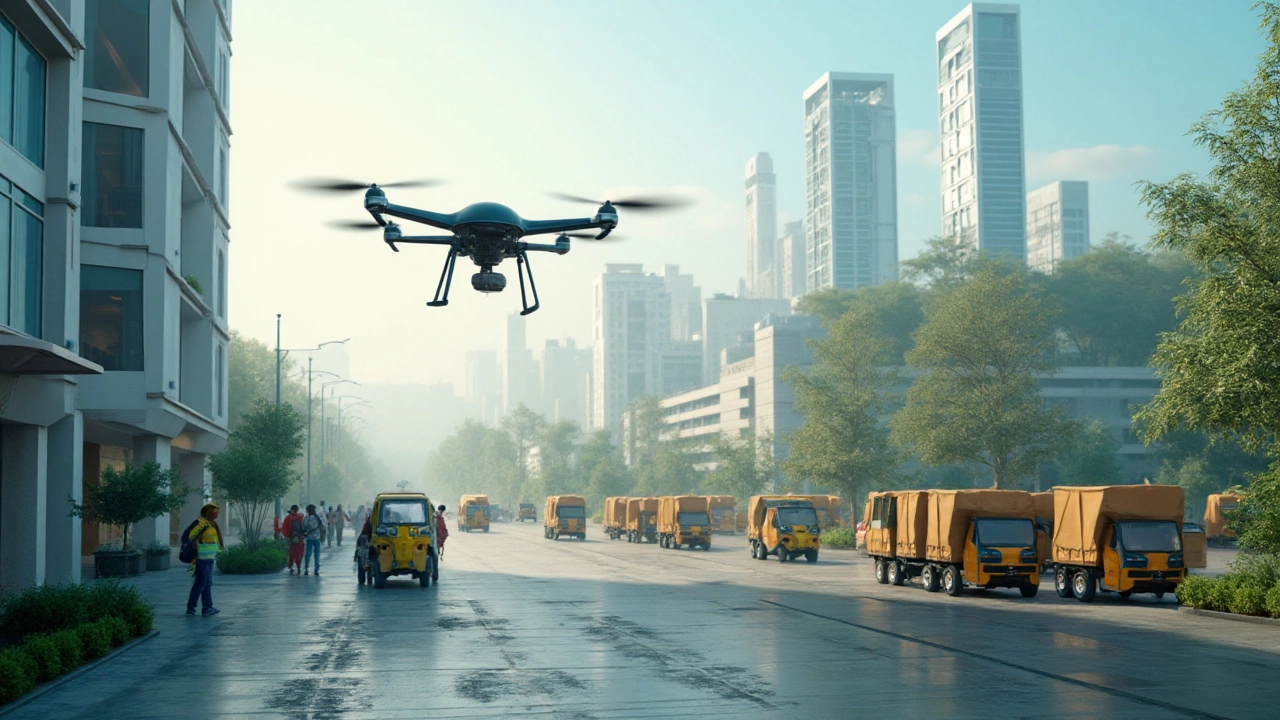
Future Trends in Global Logistics
As we dive into the future of global transport, it's clear that logistics companies are at the frontier of significant transformative changes. The traditional models of moving goods from point A to point B are being reshaped by several audacious innovations and unexpected market demands. For instance, advances in technology, particularly in automation and the Internet of Things (IoT), have begun to streamline operations and improve efficiency in unprecedented ways. Automated warehouses, equipped with autonomous picking systems and drones, are becoming more prevalent, drastically reducing the time from order to shipment. IoT sensors provide real-time data, allowing for more accurate tracking and inventory management. All of these enhancements are foundational to what is known as 'Smart Logistics'. According to a report by Gartner, "By 2027, at least 60% of global logistics companies will have integrated advanced analytics and automation into their operations." This reflects a growing trend where data-driven decision making becomes critical.
Another noteworthy trend is the escalating emphasis on sustainability within the logistics industry. With climate change concerns at an all-time high, many companies are committing to reducing their carbon footprint. This can be seen through initiatives such as investing in electric and hybrid vehicle fleets. In addition, there is an increasing focus on optimizing routes to minimize fuel consumption, which also aligns with reducing overall emissions. A fascinating progression here is the rise in 'circular logistics'—a system where logistics companies design reverse logistics processes, allowing used products to return to manufacturers for reuse or recycling. In effect, this not only preserves resources but also reduces waste. Industry leaders like DHL are setting ambitious goals to achieve zero emissions logistics by 2050.
In parallel to technological and environmental changes, shifts in market demands and consumer expectations are compelling logistics companies to adapt rapidly. The rise of e-commerce has reshaped consumer behavior significantly, pushing companies to offer faster and more reliable delivery services. This has led to the development of last-mile delivery solutions, which are pivotal in ensuring goods reach their final destination swiftly. Innovations like drone deliveries and delivery lockers are addressing some of these challenges efficiently. Companies are investing in sophisticated delivery network operations that were previously seen as futuristic. The requirement for flexibility and resilience has never been greater, demanding robust contingency planning for disruptions—whether from global pandemics or supply chain issues—must be reinforced.
Another facet that is gaining momentum in supply chain management is blockchain technology. Its application ensures transparency and traceability throughout the supply chain, which is pivotal for both security and ethical sourcing. With blockchain, companies can validate the provenance of their goods, as well as document every exchange in the supply chain, making it nearly impossible for fraudulent activities to occur. This transparency builds trust with consumers, particularly in sectors where verifying the authenticity of goods is crucial, such as pharmaceuticals and luxury items. A recent study highlighted that "usage of blockchain in logistics could save costs and enhance efficiency by 20% within the next decade." This shift highlights a promising trend towards more secure and accountable global logistics systems.
Looking ahead, artificial intelligence (AI) and machine learning are poised to drive significant enhancements in logistics operations. These tools enable predictive analytics, which can anticipate demand patterns and optimize resource allocation efficiently. Some companies are leveraging machine learning algorithms to redefine their customer service operations, using chatbots to handle inquiries and streamline order processes. AI-driven tools can also automate freight booking, thereby improving route planning and reducing administrative burdens. As companies continue to experiment with AI solutions, the potential for breakthroughs that replace human-initiated decisions with machine-driven accuracy could be incredibly transformative.
